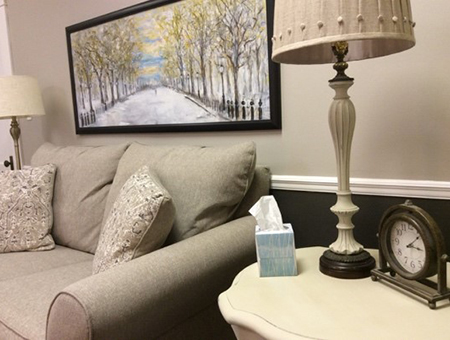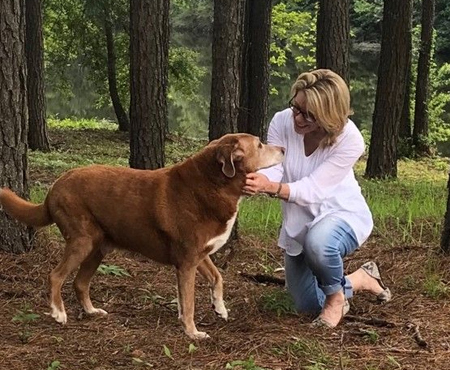 Maybe you’ve seen this on TV or at the movies…
Maybe you’ve seen this on TV or at the movies…
The client’s face is so red it’s almost purple. His hands are clenched tightly in his lap, and salty tears trickle down his cheeks. Through his sobs, he chokes out the experience of walking in on his wife having sex with his best friend. The TV camera moves in for a close-up to see the therapist checking her Instagram account.
“And how did that make you feel?” she asks without looking up.
The client’s expression lands somewhere between confusion and anger. “How do you think it felt?!” he shouts.
The therapist nods, jots a few notes, and forces a fake smile. “Please continue.”
This is NOT AT ALL what therapy is like with me.
Hollywood’s portrayal of therapy is often the only reference point many clients have for what to expect in therapy – a disinterested therapist who seems clueless, or a Freud-like character who hears sexual implications in every one of his clients’ statements. Either way, both are Hollywood creations.
Hmmm… you may wonder, so what is therapy really like?
Well, it depends to some extent on the nature of why you are seeking therapy. A couples session will be quite different from an individual session. Still, in general terms, therapy is about establishing a relationship with a trained professional that will help you assess your current situation. We collaborate and identify goals that will allow you to live the life you wish to have.
What you choose to discuss in therapy is up to you and is completely confidential. The therapeutic relationship is unique in that you can say exactly what you think and feel without being afraid of hurting someone’s feelings, or being judged, or criticized, or punished. Anything you want to talk about is okay.
As far as what it’s like to work with me specifically, it’s all about the relationship you and I create.
 I love getting to know my clients.
I love getting to know my clients.
I have a genuine interest and curiosity in people, and my clients respond to this.
By the time clients make it to therapy, they have usually been suffering for a while.
I can see the change in their demeanor within minutes of the start of our first session as their anxiety begins to ease. Just the experience of being heard seems to release a weight. It’s like they’re thinking, “Finally, some relief…”
One client told me after our first session, “Gee, that was actually fun. I didn’t know what to expect, but I already feel better.”
Maybe this experience of “I already feel better” is due to the comfy pillows, ambient lighting, and neutral tones of my office décor, but I prefer to credit my genuine curiosity, compassion, and upbeat nature.
There’s something magnetic about connecting with a client who has mustered the courage to call and make an appointment. That’s not an easy thing to do. My clients have asked for help, and the courage behind their vulnerability draws me. This attunement usually happens quickly, and I consider my ability to empathically connect with clients to be my greatest strength as a therapist. And, according to the research, this is a good thing as it is the leading predictor of successful therapy – even beyond the therapeutic method used.
Speaking of methodology… although it may not be the most important determinant of successful therapeutic experience, it is important.
The method of therapy I use depends on the client and their specific challenges. The individuals I work with will often identify anxiety or depression as their challenge. Other clients will reach out because they struggle with addictive behaviors around alcohol or substance abuse, and some will seek help for overeating.
In many of these cases, I will use Mindfulness-Based Cognitive Therapy or Solution-Focused Therapy. I help clients understand the workings of their minds and help them focus on what is working right here and now, as well as identify what changes they may need to make to live the life they want. Then we figure out together how to make those changes.
 In my work with couples…
In my work with couples…
… it may be a specific issue that has brought the couple in for therapy – pornography or substance abuse, for example. Other times their description is more general – loss of connection, lack of communication, life transitions – any myriad of presenting problems.
These are usually symptoms of an underlying issue within the relationship and one of the reasons I use the Gottman Couples Therapy Method. This particular method utilizes a comprehensive on-line assessment tool that provides a wealth of information and insight into the couple’s challenges. It allows my clients and me to hit the ground running and progress quickly. It is a structured therapy with concrete steps and interventions that couples can master and use immediately. Couples typically feel some relief after just a few sessions and are motivated to continue.
I also incorporate Mindful Communication teaching. Mindful communication skills help couples understand the meaning of their communication beyond the actual spoken words. Here is an example of how one of my couples learned to understand each other’s communication tendencies in a new light and reduced the conflict in their relationship.
Leslie* learned that when Steve* tried to mansplain things to her, it was not intended to be demeaning, but rather was an emotional bid to meet his own need to feel competent and confident. Steve acknowledged his tendencies in this area and has worked to minimize this behavior, and Leslie no longer reacts with anger but with understanding. Likewise, when Steve accepted that Leslie’s tearful phone call about a speeding ticket was seeking emotional support and not a solution, he was able to meet her needs more effectively by listening and empathizing rather than telling her what to do.
Mindful communication can be effective in reducing conflict and improving the connection. This clear communication is a life-changing skill and one that you and your partner will benefit from.
 I provide validation when you need it, a challenge when you’re stuck, and firm push when you need that, too.
I provide validation when you need it, a challenge when you’re stuck, and firm push when you need that, too.
The trusting relationship we develop allows me to help you chart a course to a new future despite any obstacles you may encounter.
Together, we figure out what needs to change; we collaborate and set some therapeutic goals. We identify the challenges and obstacles that are getting in the way of you making these changes, and we work through those.
Sometimes you will gain insight and see things differently; other times, you may need to develop new skills which will allow you to interact in a different, more effective manner. Some days you may need validation and support, while on other days you may need to be challenged or even a solid push. It is the trusting, therapeutic relationship that allows these dynamics to work successfully.
Don’t get me wrong: Therapy can be really tough.
We are ALL a culmination of our experiences, and many of those experiences are painful.
I worked with one client whose unfaithful, narcissistic spouse left the relationship and blamed my client’s addiction. They had raised a family and had been together for many years. My client wanted desperately to save their marriage, but it was not possible. The depth of her pain and fear was palpable.
She was depressed, she was anxious, she struggled with past trauma. She found herself in the position of having to grieve the loss of her partner, her family as she had known it, her identity, her home, and to top it off, the only friend she’d had for years – the bottle. This woman is a hero. She allowed me to have a ringside seat to her struggle. She was vulnerable; she accepted my challenges; she trusted me and kept working even when she wanted to quit. She relapsed twice. Eventually, she was able to hold herself accountable and was successful in learning to manage her disease. She did some incredibly difficult work and continues to work at it every day. She likes to give me credit, but we both know who earns that sobriety chip she receives each year.
So yes, therapy can be hard work. And change can be difficult. But the alternative is staying where you are.
The life you want is possible. Decide to take that first step.
 And when you reach that mountaintop, the view is awesome.
And when you reach that mountaintop, the view is awesome.
I received an email the other day from a former client letting me know that she and her spouse had just celebrated their 5th anniversary.
She said they were happy. She attached a picture of her husband and their 3-year-old son from a recent trip to the Smokey Mountains. Their little family had struggled through some difficult times, and this couple wasn’t always certain they could repair the damage.
Their commitment was strong, and together they were able to rebuild the trust in their relationship. They worked hard to save their marriage, which required both to make some changes. They connected in a new way and were successful in transforming their relationship as a couple, as well as provide a more nurturing environment for their son. I love getting those emails…
*Names changed to preserve client confidentiality.
About Me
 I remember the first time I went to therapy.
I remember the first time I went to therapy.
I was scared because there were things I wanted to say but wasn’t sure I’d have the courage to speak.
My entire family was together in the therapy room, and we had been struggling with some family business issues that seemed to be getting worse by the day. I remember thinking this was going to be a nightmare.
As it turned out, I didn’t do much talking at all that day, but I remember that I cried. As I got more comfortable with our therapist, I opened up in subsequent sessions. We all did.
We learned to understand each other differently. We learned some practical communication skills, we learned about boundaries – and each changed in our own way.
In the end, it was a transformative experience and helped our family heal. It is the reason I am a therapist today.
 When I’m not doing therapy…
When I’m not doing therapy…
I am usually doing something creative. I enjoy cooking, sewing, quilting, writing, painting, etc. I also enjoy traveling and meeting new people.
I’d like to be your therapist. Call me, and let’s talk.
I enjoy my work as a therapist because helping others make a positive change in their lives is extremely rewarding. I know it can feel hopeless sometimes – the thoughts that “this will never change” or “this is how my life is destined to be” seem so real and overwhelming.
But things CAN change, and they DO. And it starts with one step.
So, if you are wondering if working with me might help, let’s take the time to figure that out. I offer a free, 20-minute phone consultation where we can discuss your present concerns, and you can determine if we are a good fit to work together.
Call me today: (601) 498-8263.

